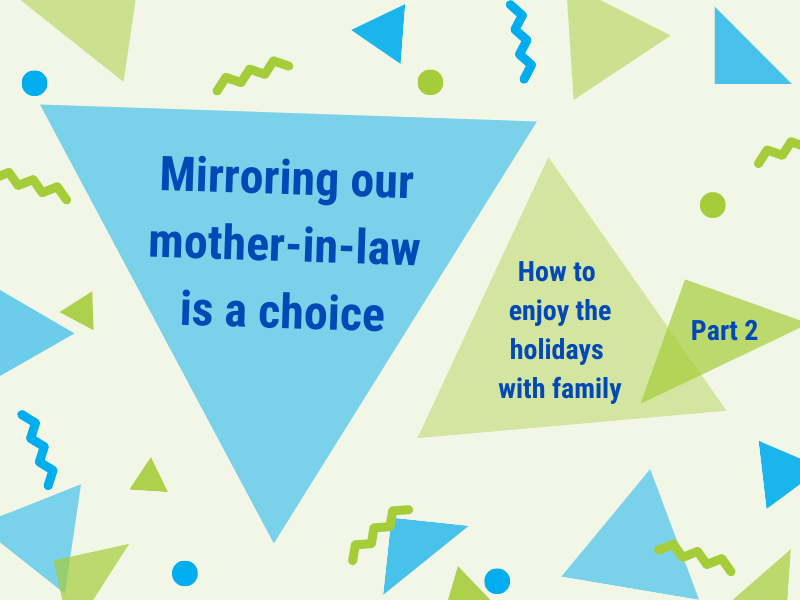What is mirroring and how can we manage it intentionally?
Human beings are social beings and that’s why relationships with others impact our lives significantly.
We all crave connection and approval, we want and need to feel loved and valued by others, especially our family members and close friends.
As relationships are so important to us, we want them to be good, and healthy, positive and enjoyable.
But – as we all know – relationships can be challenging and complicated.
This is especially the case at times like the upcoming festive season when we come together with family members we haven’t seen for a while, and when we generally spend much more time together with our relatives than usual throughout the year.
We want to have a good time together and enjoy each other’s company.
A typical human way of building strong connections and greater understanding with someone else is to mirror the other person.
Mirroring happens subconsciously most of the time. We are usually not aware that we are replicating another person’s nonverbal signals, that we imitate their gestures, speech patterns, attitudes or moods.
The positive effects of mirroring each other
In many circumstances and situations, mirroring serves us well and there is no need to become more aware of our imitating actions and reactions. We don’t need to change what makes us feel good.
Imagine a situation like this one:
Your aunt is coming over for Christmas dinner. And she is apparently very happy to see you, she is lovely and kind, and smiling, and curious and asks you a lot of questions.
You’ll probably mirror her without even thinking about it: You direct your attention to your aunt, and start smiling, too, and you react and respond in a kind and friendly way, and show interest in her. The two of you have a lively conversation and feel connected and close to each other.
The negative effects of mirroring each other
Unconscious mirroring, though, can also create problems occasionally. And it seems that this happens especially in emotionally charged situations such as family gatherings.
We not only mirror positive good-feeling signals from others, we also mirror negative attitudes and behaviours.
If someone is critical or judgemental of us, our default reaction is to move into that same negative space. We tend to become critical and judgemental, too.
Imagine a scenario like this one:
Your mother-in-law joins you in the kitchen while you are preparing the Christmas dinner. And she immediately starts criticising what you are doing, suggesting other – ‘better’ – ways of meal preparations, giving comments like ‘you never knew how to do this correctly, I’ll better do this’.
Your normal human behaviour will be to mirror her – you will begin to think and feel and act critically and judgemental of her. Additionally, you might judge yourself for criticising your mother-in-law for her judgments of you. Probably, the atmosphere at dinner will not be very easy-going and joyful.
How can we break the circle of mirroring?
As human beings, we have the ability to override our default mirroring settings, we can decide to stop mirroring the people around us.
Breaking the pattern requires awareness.
In many cases, just the awareness of it will help us to immediately let go of the mirroring.
In other cases, it requires special attention and effort to make changes, especially if the cycle of mirroring was established a while ago and has become a habit for one (or both) people in the relationship.
We know what to expect, especially in our most challenging relationships. We know what’s probably going to happen – and we can decide to no longer allow the automatic mirroring to happen!
It helps to be well prepared and intentional before we enter a situation that usually initiates the negative mirroring on one (or both) sides.
We take our time to find one helpful thought that we want to choose on purpose when the challenging encounter takes place next time.
And we memorise that thought. We practice it, again and again, until we are 100% sure that we will easily remember it when we’ll need it.
A powerful thought for the mother-in-law scenario described above could be:
-
- My mother-in-law is critical and judgemental and that’s o.k. It’s all about her and has nothing to do with me. She can be critical – and I can be calm.
- Or: Okay, she needs to be right all the time. I can understand that. I don’t mind. I don’t need to be right all the time.
- Or: Mirroring my mother-in-law is a choice. This year I choose not to mirror her. That’s actually a relief. I can show up as I want to.
What about you and your mirroring tendencies?
What are the situations and relationships that trigger your negative mirroring pattern?
What if you decided to get well prepared – choose a powerful thought and practice it! – and to let go of the mirroring?
How could that positively change the ‘typical’ scenario?
The ‘How to enjoy the Holidays with Family’ Series.
Read more:

